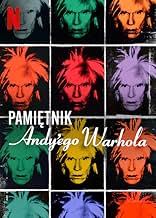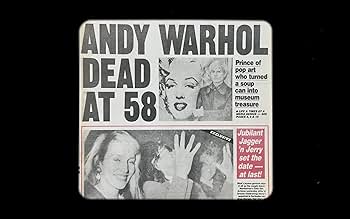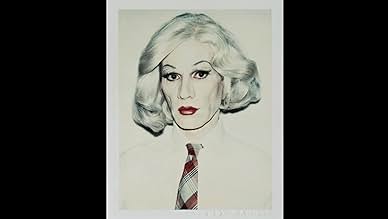PUNTUACIÓN EN IMDb
7,6/10
2,9 mil
TU PUNTUACIÓN
Tras ser disparado en 1968, Andy Warhol empieza a documentar su vida y sentimientos. Esos diarios, y esta serie, revelan los secretos del hombre más allá del personaje.Tras ser disparado en 1968, Andy Warhol empieza a documentar su vida y sentimientos. Esos diarios, y esta serie, revelan los secretos del hombre más allá del personaje.Tras ser disparado en 1968, Andy Warhol empieza a documentar su vida y sentimientos. Esos diarios, y esta serie, revelan los secretos del hombre más allá del personaje.
- Nominado para 4 premios Primetime Emmy
- 2 premios y 9 nominaciones en total
Explorar episodios
Reseñas destacadas
This was a binge watch for me as the 70's & 80's was my time in NYC living in an illegal loft before Soho became the in place for the BBQ crowd, I don't mean barbeque. I knew most of the people that hung out with Warhol and Basquiat and met both of them many times during the disco, drugs, drinks era. I spent most of my salary each month buying art from both of them when Basquiat was selling signed drawings on postcards for $25 and Warhol who couldn't give away his Campbell soup can paintings away at the The Odeon, which is celebrating their 42nd anniversary this year. Yes I had great insight at that time of what would be one day and now smile every time I see the prices that both of these artists command at auction. The documentary by Ryan Murphy focuses more on Warhol's lonely life as a closeted gay man looking for love and his obsession with beautiful Waspy men and death. The interviews with his inner circle that are still alive was insightful but as my title says no one will ever know the real Andy Warhol.
A class act on all fronts.
First of all, from the credits on in, it looks sumptuous. The use of digital technology is far more aesthetically sophisticated than pretty much anything I'm seeing from Hollywood and shows, like only one or two other films I'm aware of (the neo Giallo 'Amer' is one) that digital at its best can make a vital, valuable contribution to movie imagery. We even get a sort of implicit origin story for all this in a couple of clips of Warhol trying early computer drawing programmes, once with instruction from Steve Jobs. The leap from that to this doc is something like that from kid's drawing to the high Renaissance. Here, the tech is used to seamlessly weave together an extraordinarily rich array of filmed source material available on Warhol with modern-day interviews and give the whole a lushness at least equal to that of film.
The digital finishing touch: with the permission of the Andy Warhol Foundation, Warhol's voice has been computer simulated to read the diaries - and just as the computerised imagery achieves warmth, the voice, the seeming summa of Warhol's stated desire to become a machine, has a surprisingly human quality, its hint of melancholy entirely right for the diaries.
This little irony of Warhol finally becoming a machine but the machine achieving feeling is almost a metaphor for the story being told here, for the likely discovery of what being a machine meant to Warhol as a man. In an almost aggressively gleeful flouting of Barthes' 'Death of the Author,' the doc is primarily about Warhol's personal life, especially his long-term love relationships with men. Excellent as Barthes' argument is in many ways, we might note at this point that he was himself a gay man in a homophobic time, who may have had his own reasons for wanting to keep the author's biography in the shadows.
This is the question being asked here: how much was Warhol's brilliantly constructed artistic persona - machinelike, detached, asexual - born of a need to hide or at least make palatable his homosexuality? As discussed here, this is not a reductive question. It more than allows for the fact that, as all art is artifice, the need to veil certain messages can actually enrich the work, and also for Warhol's work still to be read through other lenses. Nevertheless, given the way the persona played itself out in the work, I think the series makes an incredibly strong argument that this is a question, and an area of his biography, that Warhol scholarship cannot ignore, that the personal likely mattered to the work even in terms of the way it was hidden by the work.
Fortunately, for the filmmakers and the viewers, it also, by its nature, makes for a fascinating, touching human story.
First of all, from the credits on in, it looks sumptuous. The use of digital technology is far more aesthetically sophisticated than pretty much anything I'm seeing from Hollywood and shows, like only one or two other films I'm aware of (the neo Giallo 'Amer' is one) that digital at its best can make a vital, valuable contribution to movie imagery. We even get a sort of implicit origin story for all this in a couple of clips of Warhol trying early computer drawing programmes, once with instruction from Steve Jobs. The leap from that to this doc is something like that from kid's drawing to the high Renaissance. Here, the tech is used to seamlessly weave together an extraordinarily rich array of filmed source material available on Warhol with modern-day interviews and give the whole a lushness at least equal to that of film.
The digital finishing touch: with the permission of the Andy Warhol Foundation, Warhol's voice has been computer simulated to read the diaries - and just as the computerised imagery achieves warmth, the voice, the seeming summa of Warhol's stated desire to become a machine, has a surprisingly human quality, its hint of melancholy entirely right for the diaries.
This little irony of Warhol finally becoming a machine but the machine achieving feeling is almost a metaphor for the story being told here, for the likely discovery of what being a machine meant to Warhol as a man. In an almost aggressively gleeful flouting of Barthes' 'Death of the Author,' the doc is primarily about Warhol's personal life, especially his long-term love relationships with men. Excellent as Barthes' argument is in many ways, we might note at this point that he was himself a gay man in a homophobic time, who may have had his own reasons for wanting to keep the author's biography in the shadows.
This is the question being asked here: how much was Warhol's brilliantly constructed artistic persona - machinelike, detached, asexual - born of a need to hide or at least make palatable his homosexuality? As discussed here, this is not a reductive question. It more than allows for the fact that, as all art is artifice, the need to veil certain messages can actually enrich the work, and also for Warhol's work still to be read through other lenses. Nevertheless, given the way the persona played itself out in the work, I think the series makes an incredibly strong argument that this is a question, and an area of his biography, that Warhol scholarship cannot ignore, that the personal likely mattered to the work even in terms of the way it was hidden by the work.
Fortunately, for the filmmakers and the viewers, it also, by its nature, makes for a fascinating, touching human story.
I had no idea about Warhol's life except for his pop and Campbell's art. This documentary shows the human side of the artist. His weakness, fears, insecurities for which his only outlet would've been his art. Like most people in the industry, his brilliance had a price to pay. I respect his art, even though I am not a fan I watched this with an open mind and learned so much more.
I just had a vague idea of Andy Warhol's art and knew nothing of his personality. I thought several of the people interviewed were really insightful. A few were bordering on bitchy.
Jessica Beck, Glenn Ligon, Jay Johnson, Jay Gould all very interesting.
My only criticism is the timeline wasn't accurate in some episodes. They mention Rock Hudson passing (85 or 86) then suddenly its 1983 in Central Park at a Diana Ross concert. A small complaint, I know.
I wonder why Liza, Grace Jones and Diana Ross were not interviewed. I just assume they were pals at Studio54. Speaking of which, the video clips from that club were really cool.
Lastly, for someone old enough to remember the onset of the AIDS crisis, it was portrayed very accurately (in my opinion) and it also was gut-wrenching to kind of be transported back to that time. Definitely enjoyed the show and got a sense of who he was, personally.
Jessica Beck, Glenn Ligon, Jay Johnson, Jay Gould all very interesting.
My only criticism is the timeline wasn't accurate in some episodes. They mention Rock Hudson passing (85 or 86) then suddenly its 1983 in Central Park at a Diana Ross concert. A small complaint, I know.
I wonder why Liza, Grace Jones and Diana Ross were not interviewed. I just assume they were pals at Studio54. Speaking of which, the video clips from that club were really cool.
Lastly, for someone old enough to remember the onset of the AIDS crisis, it was portrayed very accurately (in my opinion) and it also was gut-wrenching to kind of be transported back to that time. Definitely enjoyed the show and got a sense of who he was, personally.
A wonderful peep behind the curtain of a genius self centered manipulator. His self marketing has never been repeated. Unser the wig was a brilliant mind. All can learn from these diaries. Was Warhol a good human being ? No.
¿Sabías que...?
- CuriosidadesA voice cloning technology called "Resemble AI" was used to recreate Andy Warhol's voice. Director Andrew Rossi explained that it stemmed from Warhol's desire to be emotionless like a machine.
Selecciones populares
Inicia sesión para calificar y añadir a tu lista para recibir recomendaciones personalizadas
- How many seasons does The Andy Warhol Diaries have?Con tecnología de Alexa
Detalles
- Fecha de lanzamiento
- País de origen
- Sitios oficiales
- Idioma
- Títulos en diferentes países
- The Andy Warhol Diaries
- Ver más compañías en los créditos en IMDbPro
- Duración1 hora
- Mezcla de sonido
- Relación de aspecto
- 16:9 HD
Contribuir a esta página
Sugerir un cambio o añadir el contenido que falta





































